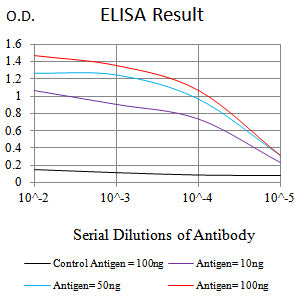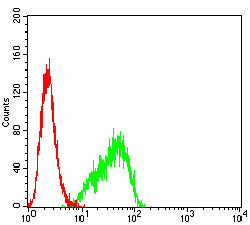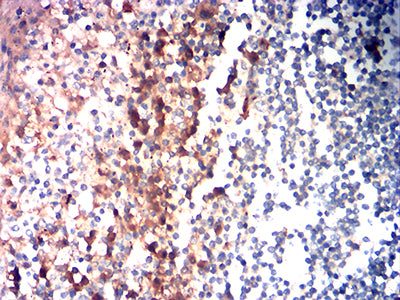


| WB | 咨询技术 | Human,Mouse,Rat |
| IF | 咨询技术 | Human,Mouse,Rat |
| IHC | 1/200-1/1000 | Human,Mouse,Rat |
| ICC | 技术咨询 | Human,Mouse,Rat |
| FCM | 1/200-1/400 | Human,Mouse,Rat |
| Elisa | 1/10000 | Human,Mouse,Rat |
| Aliases | LILRA4;ILT7 |
| Entrez GeneID | 23547 |
| clone | 4B3E4 |
| WB Predicted band size | 55.2kDa |
| Host/Isotype | Mouse IgG1 |
| Antibody Type | Primary antibody |
| Storage | Store at 4°C short term. Aliquot and store at -20°C long term. Avoid freeze/thaw cycles. |
| Species Reactivity | Human |
| Immunogen | Purified recombinant fragment of human CD85G (AA: extra 24-178)) expressed in E. Coli. |
| Formulation | Purified antibody in PBS with 0.05% sodium azide |
+ +
以下是关于CD85G(LILRB2)抗体的3篇参考文献,按研究重点分类列举:
---
1. **标题**: "LILRB2-mediated immune checkpoint regulation in acute myeloid leukemia"
**作者**: Chen et al.
**摘要**: 研究揭示了CD85G(LILRB2)在急性髓系白血病(AML)细胞中的免疫抑制功能,开发了一种靶向LILRB2的单克隆抗体,可阻断其与HLA-G的相互作用,增强T细胞对AML细胞的杀伤作用。
---
2. **标题**: "Structural basis of LILRB2 recognition by anti-inflammatory antibodies"
**作者**: Zhang Y. et al.
**摘要**: 通过冷冻电镜解析了CD85G(LILRB2)与其抑制性抗体的复合物结构,阐明了抗体如何通过结合LILRB2的免疫球蛋白样结构域,抑制其在自身免疫性疾病中过度激活的负向免疫信号通路。
---
3. **标题**: "A novel anti-LILRB2 antibody enhances dendritic cell-mediated antitumor immunity"
**作者**: Wang et al.
**摘要**: 报道了一种新型抗CD85G(LILRB2)抗体,可阻断肿瘤微环境中LILRB2与配体的结合,逆转树突状细胞的功能抑制,显著提升肿瘤模型中的免疫治疗效果。
---
**备注**:CD85G(LILRB2)抗体研究多集中于肿瘤免疫治疗和自身免疫病领域,上述文献涵盖机制、结构及治疗应用。若需具体文献链接或更早期研究,可进一步补充检索关键词(如"LILRB2 therapeutic antibody")。
CD85g antibody targets the CD85g (also known as LILRB4. ILT3. or LIR-5), an inhibitory receptor within the leukocyte immunoglobulin-like receptor (LILR) family. Expressed primarily on antigen-presenting cells (APCs) like dendritic cells and monocytes, CD85g contains immunoreceptor tyrosine-based inhibitory motifs (ITIMs) in its cytoplasmic domain, enabling it to recruit phosphatases (e.g., SHP-1/SHP-2) that dampen immune activation signals. This receptor plays a critical role in maintaining immune tolerance by suppressing T-cell responses and promoting regulatory T-cell (Treg) differentiation.
In cancer, CD85g is often overexpressed in tumor-associated APCs and certain malignancies, contributing to immune evasion by inhibiting cytotoxic T-cell activity. Its involvement in immune checkpoint pathways has made it a potential therapeutic target. Blocking CD85g may enhance anti-tumor immunity, while agonistic approaches could mitigate autoimmune or inflammatory conditions. Recent preclinical studies and early-phase clinical trials explore antibodies modulating CD85g to recalibrate immune responses in oncology and autoimmune diseases. However, its dual role in immune regulation necessitates careful targeting strategies to avoid unintended immunosuppression or hyperactivation. Research continues to clarify its interactions with ligands like HLA-G and angiopoietin-like proteins, further defining its therapeutic potential.
×